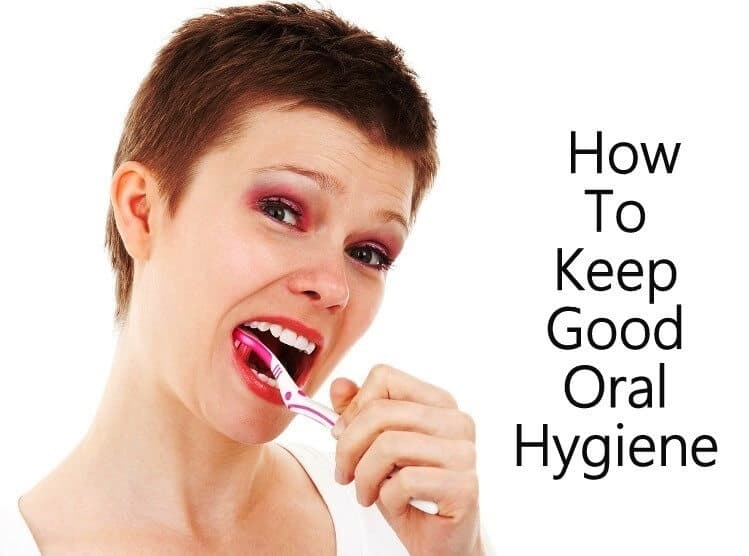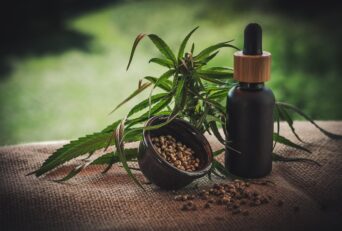Here’s an easy way to keep good oral hygiene naturally at home.
Most of us are aware that regular dental check-ups are a key element to maintaining good oral health.
You should have a dental health check-up as part of a strategy to prevent and treat any problems related to oral.
However, following some simple steps at home will keep your mouth healthy, and your smile bright and beautiful.
Table of Contents
How To Keep Good Oral Hygiene Naturally At Home
1. Brush Your Teeth
The single most important thing you can do for a healthy mouth is brushing your teeth – thoroughly and regularly.
Brushing helps to protect your mouth from plaque. Plaque is the sticky bacteria that builds up on teeth and gums.
This bacteria produces acids that weaken tooth enamel, irritate gums and lead to tooth decay and gum disease. This is the number one cause of tooth loss in adults.
If plaque is not removed, it hardens to form tartar, the solid build-up of calculus on the teeth. Your dentist will need to remove using ultrasonic tools and hand instruments.
Tartar’s rough surface provides the ideal environment for further plaque deposits, which is why the smooth surface that brushing presents it is so important – the bacteria cannot stick to it.
For brushing to be effective, you must do it correctly – the toothbrush should be placed at a 45-degree angle against the tooth and gum and a gentle, circular motion used, rather than a vigorous back-and-forth motion; Which which may cause gums to recede. Spend a couple of seconds on each tooth surface, including the back.
You can use natural homemade toothpaste for brushing to avoid harmful side effects of toothpaste.
How To Choose Brush For Your Teeth?
Providing you are cleaning your teeth correctly, it shouldn’t matter if you are using a manual or an electric toothbrush.
But choose a brush that has soft bristles, rather than hard, which may be too abrasive for your gums.
Electric toothbrushes tend to help you from making harsh, sawing movements, and many also have timers to ensure you clean your teeth for the recommended time.
It is also important to remember that the bristles on your toothbrush will lose their efficiency over time, becoming worn and less effective at cleaning your teeth.
Changing your toothbrush or the brush head of your electric toothbrush every 3-4 months will ensure your brushing routine is as good as it can be.
2. Flossing
No matter how good your teeth brushing technique and routine is, tiny food particles can often get wedged in between your teeth creating a breeding ground for bacteria.
Cleaning between teeth and under the gumline will help to remove debris, and help keep the areas free of bacteria.
Dental floss is the commonest way of cleaning between teeth, but for it to be effective, you need to ensure you have a proper technique.
You should wrap the floss around the middle fingers of both hands and slide it between teeth, gently working up and down the side of one tooth a few times, and then doing the same on the tooth next to it.
Flossing will also remove the sticky plaque that may accumulate between your teeth too.
- If you find dental floss difficult to use, you may prefer to use interdental sticks or brushes, which come in a variety of sizes to fit the tiniest of gaps.
- Gently moving the stick or brush back and forth in between teeth will remove food particles and bacteria very efficiently.
- In addition to flossing, you may also want to use an oral irrigator – an appliance that shoots a stream of water into hard-to-reach places in your mouth.
- This is particularly useful for people with braces or fixed dentures where regular flossing methods may prove difficult.
3. Mouthwash
Mouthwashes may provide additional protection against dental health problems, as well as freshen your breath.
You can make your herbal mouthwash at home, using natural ingredients such as tea tree oil – a powerful antimicrobial essential oil that fights bacteria.
Add a few drops to a glass of warm water and rinse your mouth with it to help combat the bacteria that cause gum disease and tooth decay. You can use it in combination with other natural herbs to make it taste better, including chamomile or rosemary, or with fresh mint or peppermint oil as a breath-freshener.
You can use it in combination with other natural herbs to make it taste better, including chamomile or rosemary, or with fresh mint or peppermint oil as a breath-freshener.
Oil Pulling is the best method to detoxify your body.
4. Food
Keeping your teeth clean is essential for your dental health, but certain foods can help or thwart your efforts.
By all means, eating a little of what you fancy is fine, as long as you take steps to counteract the effects on your teeth.
Perhaps eating them in moderation is the best way to minimize the damaging effect on your teeth.
High-acid foods are damaging to the enamel on your teeth – this includes fruit and their juices – as well as sugary, fizzy drinks. Sugar, particularly, creates a favorable environment for bacteria, and if you are continually consuming sugary snacks and beverages throughout the day, you are not doing yourself any favors – unless you are cleaning your teeth after every morsel has passed your lips.
Sugar, particularly, creates a favorable environment for bacteria, and if you are continually consuming sugary snacks and drinks throughout the day, you are not doing yourself any favors – unless you are cleaning your teeth after every morsel has passed your lips.
You can help to strengthen tooth enamel by eating foods rich in calcium, and including vitamin D-rich foods will help your body to absorb the calcium.
Foods That Are Good For Your Teeth
- Foods were high in calcium, such as dairy products, like milk, cheese, and yogurt, as well as leafy, green vegetables, such as bok choy or kale.
- Add food rich in vitamin D to your diet.
- Gums will benefit from vitamin C, found in red peppers and sweet potatoes, as well as citrus fruits, like oranges. However, you must be careful of the acidity in citrus fruits, being careful to neutralize the effects of the acid by brushing teeth beforehand and rinsing after.
- Crunchy vegetables like carrots or celery can help to remove the bacteria from your teeth.
Foods That Are Bad For Your Teeth
- Fizzy drinks and fruit juice – especially if you are sipping them throughout the day, subjecting your teeth to prolonged exposure to sugar and acid.
- Sticky, hard coffee and sweets. Sucking on sweets exposes your teeth to harmful acid and sugar for a protracted period, and sticky toffees are not good because of the sugar sticks to your teeth, providing another perfect environment for bacteria.
- Carbohydrate foods, including potato chips, pasta, and white bread tend to have food particles that stick into the ridges of your teeth, creating a breeding ground for those harmful bacteria.
- Hard foods are damaging as they can chip or crack your teeth, as well as your fillings. Hard candy, pretzels, and even ice may be a problem, and you should also be careful of foods that may contain stones, such as olives.
- Citrus foods like oranges, lemons, limes, and grapefruit are high in vitamin C and great for healthy gums but are also high in acid and bad for your teeth enamel.
- Some foods, while not damaging in themselves to your teeth, create staining or discoloration of your teeth, which may be difficult to remove. Using abrasive products or brushing too hard to remove the stains could result in damage to your teeth and gums.
5. Cigarettes And Tobacco
The dangers of smoking cigarettes, pipes and cigars to your overall health are well-known, but it may be one of the biggest risk factors when it comes to gum disease, as smokers are more likely to suffer from this oral health problem.
More specifically, smoking interferes with the normal function of gum tissue cells, impairing blood flow and making smokers more susceptible to infections, including periodontal disease – notwithstanding the increased risk of oral cancers, stained teeth, thrush and bad breath.
Smokeless tobacco products, such as chewing tobacco and snuff are no better, containing a myriad of chemicals shown to increase the risk of oral and throat cancers, as well as irritating gum tissue, causing it to recede.
If you are facing thrush problem, follow the home remedies to get rid of it.
The message is to stop using tobacco smoking and chewing tobacco products for the good of both your oral and overall, health.
6. Good Dental Health Is Good For The Body
You can play a major role in preventing gum disease and tooth decay by making some minor adjustments to your dental care routine, which could have a beneficial effect on your overall health.
Recent studies show that oral health may provide warning signs for other conditions, including heart disease, and that people with moderate or advanced gum disease are more likely to have heart disease than those with healthy gums.
Be proactive in maintaining your dental health. Take care each day to remove plaque, tartar, and bacteria from your mouth. Make sure you schedule regular dental check-ups.
Many dental problems have no signs or symptoms and may go undetected unless you see a dental health professional – so make sure you visit your dentist regularly to keep your smile beautiful and your dental health in optimal condition.
If you are facing the problem of sensitive teeth. You can follow the amazing ayurvedic home remedies to treat sensitive teeth within 5 minutes.
If you have any questions related dental hygiene comment below. I ‘ll try to provide you the best solution for your queries.






